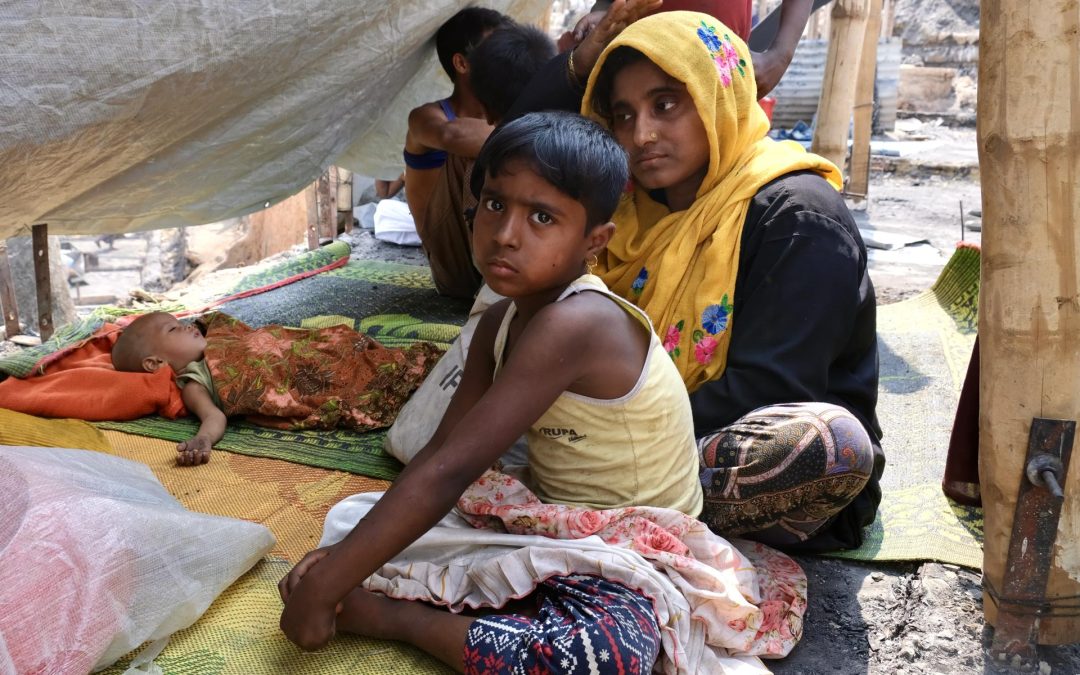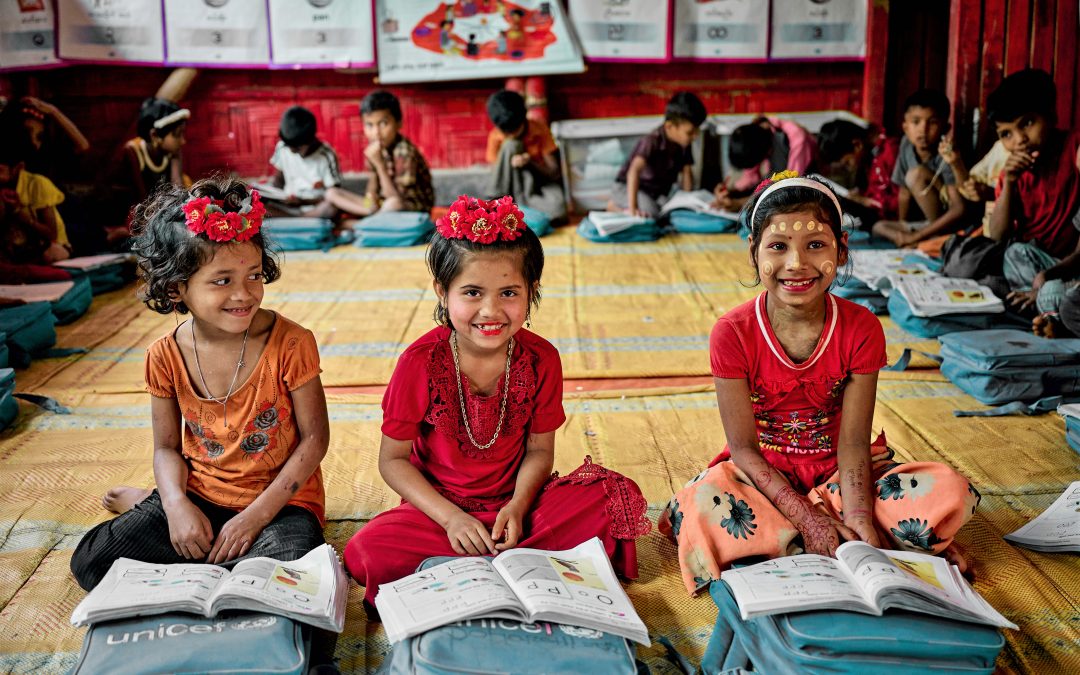
Rohingya refugee children of all ages are now studying under the Myanmar curriculum
Despite fires burning down learning centres and Cyclone Mocha’s wrath, a record 300,000 Rohingya refugee children attend first day of school.
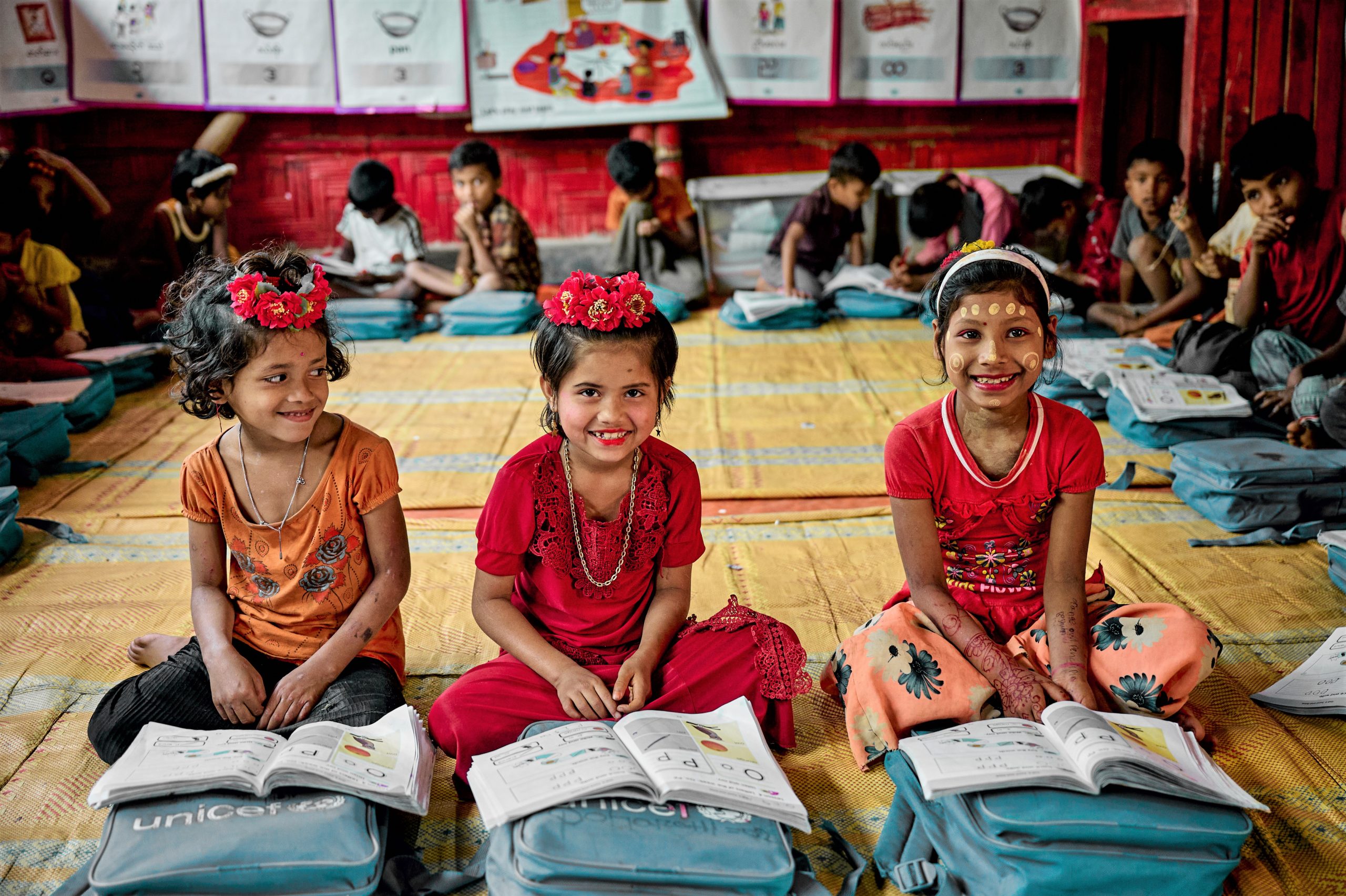 Rohingya girls happily posing for a photo inside the Mukti learning center. Pahartoli-1/2, Camp-4, Ukhia, Coxs Bazar, Bangladesh. Photo ©️ UNICEF, Sujan
Rohingya girls happily posing for a photo inside the Mukti learning center. Pahartoli-1/2, Camp-4, Ukhia, Coxs Bazar, Bangladesh. Photo ©️ UNICEF, Sujan
COX’S BAZAR, Bangladesh, 23 July 2023 – Against the odds of displacement, fires burning down learning centres, and Cyclone Mocha’s wrath, classrooms in the Rohingya refugee camps in Bangladesh are filling up today with children, excited on the first day of school. Thanks to expanded education opportunities for teenagers and girls, a record 300,000 children are enrolled for the 2023/24 school year.
The new academic year marks the first time that Rohingya refugee children of all ages will be studying under the Myanmar Curriculum. Since its launch in 2021, this formal curriculum has gradually been expanded with grades 3-5 and grade 10 opening today for the first time in the Cox’s Bazar refugee camps, significantly increasing learning opportunities for both older and younger children.
“Rohingya refugee children want to learn, and to turn their hopes and dreams for a better future to actual potential,” said Mr. Sheldon Yett, UNICEF Representative to Bangladesh. “The single most important ingredient for ensuring a safe and dignified return of these children to Myanmar is ensuring that they can continue their education while they are here in Bangladesh. I urge our partners and donors to stand by UNICEF as we deliver on our promise to provide education for every Rohingya refugee child.”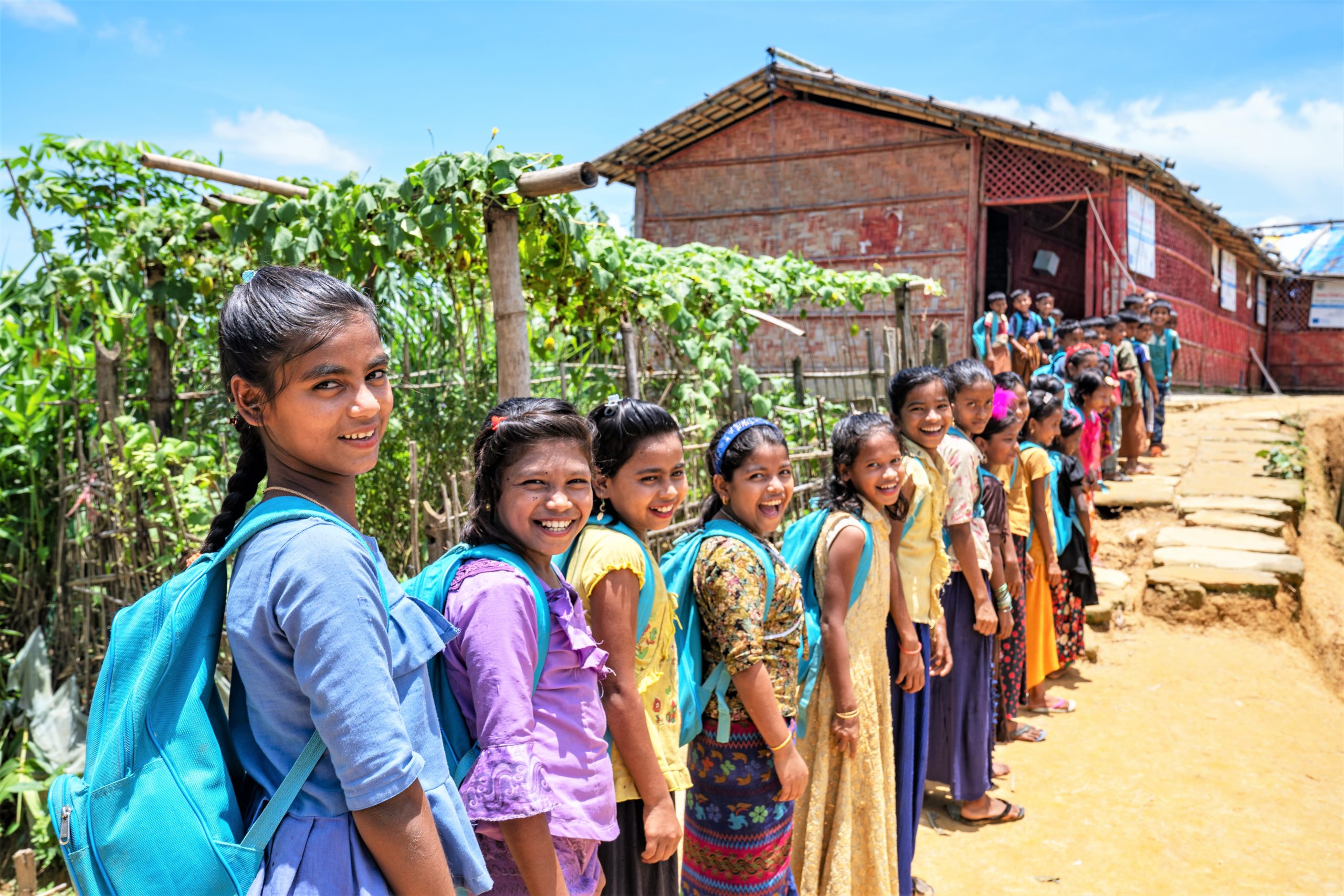 Girls on their way to the learning centre in the Rohingya refugee camp in Cox’s Bazar, Bangladesh on 9 July, 2023. Photo ©️UNICEF, Lateef
Girls on their way to the learning centre in the Rohingya refugee camp in Cox’s Bazar, Bangladesh on 9 July, 2023. Photo ©️UNICEF, Lateef
In addition to the new opportunities for older children, a dedicated campaign has brought more than 13,000 children who were out of school into the classroom. Efforts to support adolescent girls to continue their education are key to the record attendance this year. Due to social norms, parents are often reluctant to send girls to school once they reach puberty. In response, UNICEF and partners have worked closely with the refugee community to demonstrate to parents the benefits of education for girls, to provide girls-only classrooms, and to organize chaperoning to classes by female mentors.
Delivering education in the largest refugee settlement in the world is an immense operation. One million refugees – half of them children – have lived in the densely populated camps in Bangladesh since 2017 when they fled violence and persecution in neighbouring Myanmar. Education for Rohingya refugee children is provided through 3,400 learning centres – 2,800 of which are supported by UNICEF – as well as through community-based learning facilities.
On the first day of school in the camps, UNICEF appeals for US$33 million to urgently support education for Rohingya refugee children in the 2023/24 academic year.
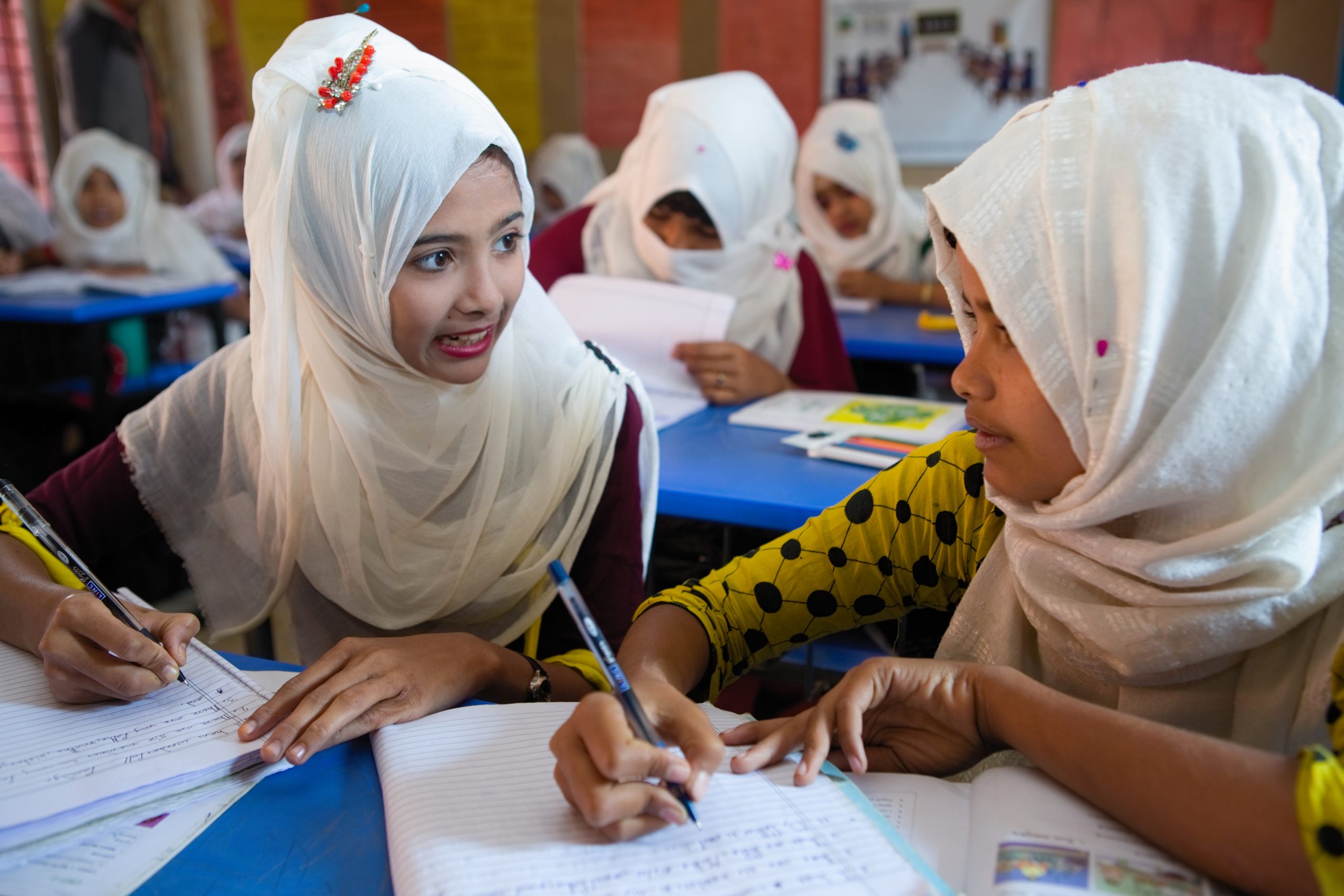 Young and adolescent girls at the UNICEF-supported learning center during their English Language session. The girls-only session is being implemented under the Myanmar Curriculum Piloting (MCP) project since May 2022. The project is being supported by UNICEF Bangladesh & implemented by Mukti at Camp 2W, Ukhiya, Cox’s Bazar on 16 February 2023. Photo ©️ UNICEF, Kiron
Young and adolescent girls at the UNICEF-supported learning center during their English Language session. The girls-only session is being implemented under the Myanmar Curriculum Piloting (MCP) project since May 2022. The project is being supported by UNICEF Bangladesh & implemented by Mukti at Camp 2W, Ukhiya, Cox’s Bazar on 16 February 2023. Photo ©️ UNICEF, Kiron
Download high-res photos here.
Download b-roll here
For more information please contact:
Kusali Nellie Kubwalo, UNICEF Bangladesh, Tel: +880 1847327230, [email protected]
Faria Selim, UNICEF Bangladesh, Tel: +880 181 758 6096, [email protected]
Joe English, UNICEF New York, +1 917 893 0692 [email protected]

